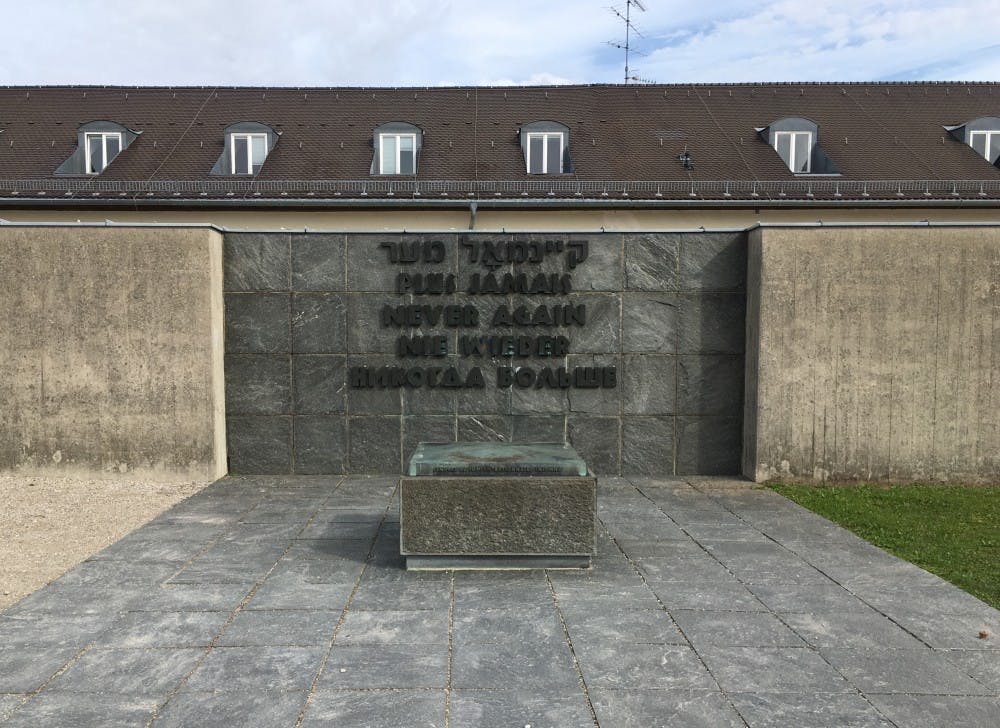Reilly Geritz, a senior at the University of Richmond and a former study-abroad student, made a list of places to travel when she planned her study-abroad itinerary last fall.
Among traveling to different countries and seeing different tourist attractions, she made it a priority to pay her respects at a concentration camp.
Geritz, along with other study-abroad students who traveled to Munich, Germany, went to Dachau Concentration Camp Memorial Site.
Dachau Concentration Camp was the first of the Nazi concentration camps, and it served as a model for all other concentration camps, according to the memorial site's online page. It is located outside of Munich, where many UR students travel annually while studying abroad.
“Dachau is pretty easily accessible outside of the city of Munich,” Geritz said. “You can take the metro as far out as it goes and then there is a short bus ride that takes you directly to the concentration camp.”
Dachau Memorial's museum provides guided tours in English at 11 a.m. and 4 p.m. daily, according to the website.
"The guides were pretty knowledgeable and provided a lot of facts and figures about what occurred at Dachau during the Holocaust, but also personal and very human experiences," she said.
Geritz said she thought it was important to learn more about the Holocaust outside of an academic setting.
“My trip to the concentration camp was particularly impactful because in the U.S. we don’t have any physical record of concentration camps in the way that European countries do,” Geritz said.
Ellie Bush, a senior and former study-abroad student, said she had been most impacted by learning about these human experiences.
“At first, I felt as though I was not equipped and had a sense of displacement that I can’t really explain,” Bush said. “We learn about the Holocaust within the confines of a world-history classroom. I had learned about it in such a safe place and I was stepping foot on what used to be such an unsafe environment.”
Bush said the memorial site had provided a lot of information, such as a museum, documentary screenings and tours of the site itself.
Enjoy what you're reading?
Signup for our newsletter
“Having such graphic visuals and then also having it be situated in the actual context where it took place was kind of an out-of-body experience and rather difficult,” she said. “The mood immediately changes once you step foot on that premise, which was so intentionally built. The whole time, I felt very tense.”
Casey Friedman, junior and current study-abroad student, found importance in visiting Dachau from a humanitarian perspective.
“At Dachau, everyone on my trip was looking at me to see how I would react because I am Jewish,” Friedman said. “It puzzled me that people were watching me. I tried to tell people that this was a much broader scale and that other groups of people were persecuted too.
“It’s also just a humanity thing. It’s not so much Germans against Jews. It’s more like people against people.”
Friedman finds that his trip to Dachau indicated the relevancy of the Holocaust today, he said.
“Seeing these buildings and all these dates, you realize how recently the Holocaust occurred,” Friedman said. “A lot of stories in Jewish history are about Jews being persecuted. It made me kind of sad to be confronted with this again. Yet, it made me proud of my heritage that we were able to overcome this.”
Geritz said she found it was important for one to make the time to visit a concentration camp, whether Dachau or elsewhere.
“It’s an experience you shouldn’t pass up if you're going to be close to such an historic site,” Geritz said. “In my experience, you can learn a lot and have a really powerful experience visiting Dachau concentration camp.”
Contact international editor Olivia Diaz at olivia.diaz@richmond.edu.
Support independent student media
You can make a tax-deductible donation by clicking the button below, which takes you to our secure PayPal account. The page is set up to receive contributions in whatever amount you designate. We look forward to using the money we raise to further our mission of providing honest and accurate information to students, faculty, staff, alumni and others in the general public.
Donate Now



